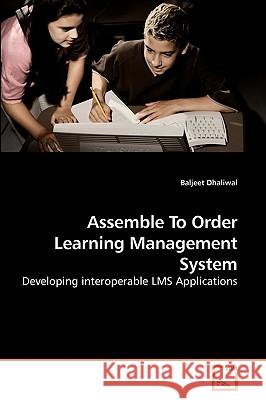Assemble To Order Learning Management System » książka
Assemble To Order Learning Management System
ISBN-13: 9783639015485 / Angielski / Miękka / 2010 / 224 str.
Every Learning Management System (LMS) comes with a unique bundle of functionalities. Most of these functionalities are neither portable nor common across various LMS. That is, a functionality developed for one LMS cannot be integrated within another LMS. Having noted that the process of software development is not very different from industrial production, we suggest a way of applying the principles of production management to software development in eLearning, particularly in the design of LMS. The functionalities in LMS are developed based on the notion of Assemble to Order (ATO) commonly found in industrial production. The thesis contends that LMS designed using the ATO approach will allow scalable and adaptable integration of functionalities across LMS. The thesis substantiates this claim using a case scenario and analytical results obtained from software engineering metrics such as Function Point Analysis (FPA) and Lines Of Code (LOC).
Every Learning Management System (LMS) comes with a unique bundle of functionalities. Most of these functionalities are neither portable nor common across various LMS. That is, a functionality developed for one LMS cannot be integrated within another LMS. Having noted that the process of software development is not very different from industrial production, we suggest a way of applying the principles of production management to software development in eLearning, particularly in the design of LMS. The functionalities in LMS are developed based on the notion of Assemble to Order (ATO) commonly found in industrial production. The thesis contends that LMS designed using the ATO approach will allow scalable and adaptable integration of functionalities across LMS. The thesis substantiates this claim using a case scenario and analytical results obtained from software engineering metrics such as Function Point Analysis (FPA) and Lines Of Code (LOC).











